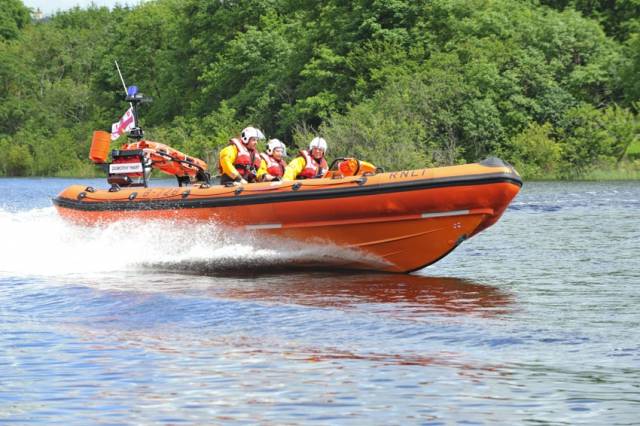#RNLI - Lough Ree RNLI's volunteer lifeboat crew had one of their busiest periods ever in the last week, receiving a total of seven callouts over five days to assist people on and around Lough Ree.
The first callout came from the Irish Coast Guard shortly 2pm on Tuesday afternoon (16 August) to reports of a 35ft steel cruiser, with six onboard, aground between Athlone Lock and Clonmacnoise.
Later that afternoon, the crew was again called to assist a man aboard a 25ft sailing yacht aground near Barley Harbour on Lough Ree.
In both cases, the recovery was straightforward and no injury to crew or damage to vessels was incurred.
On Saturday (20 August), the lifeboat crew received three calls to assist vessels in difficulty amid very wet conditions with strong winds.
The first call came shortly before noon to assist three people on board a 33ft motor cruiser that had run aground at Bantry Bay on Lough Ree.
Shortly after 3pm, the lifeboat was again called to assist two people who had rowed a lake boat from Gailey Bay campsite to Quaker Island, but were then unable to row off the island due to the strong onshore breeze.
This was a particularly difficult recovery for the lifeboat crew. After trying several methods to tow the lake boat from the shore, a crew member was put ashore in the difficult conditions to push the lake boat off the shore while the lifeboat at anchor, pulled the tow line.
Eventually, the lake boat and its crew were recovered and the two casualties were brought on board the lifeboat, where they were given life jackets and wrapped in a blanket for warmth.
The lifeboat departed the scene with the lake boat on tow shortly after 5pm and proceeded towards Portrunny, the nearest harbour, where the boat and its rowers were delivered safely ashore.
Also on Saturday afternoon, the coastguard received a call for assistance from a motor cruiser with gear box failure south of Athlone Lock.
As the lifeboat was underway to Quaker Island at the time, Athlone Sub-Aqua Club in Athlone town were requested to assist the motor cruiser south of the lock.
On Sunday evening (21 August), the lifeboat was again requested by the coastguard, this time to assist a boat aground on Lough Ree.
The weather was significantly calmer than on Saturday and the recovery went smoothly, with no damage to the grounded vessel and no injury to its crew.
Commenting on Sunday evening, Lough Ree RNLI lifeboat operations manager Damien Delaney said,
"Our volunteer lifeboat crew have had a very busy few days," said Lough Ree RNLI lifeboat operations manager Damien Delaney after the Sunday evening callout. "We would urge everyone using Lough Ree to ensure they are familiar with the area and to take heed of any weather warnings issued by Met Éireann.
"Grounded vessels are not unusual but with any callout there are a number of factors that should be considered such as the wind direction, the weather conditions and the ability of crew and vessel to navigate these.
"It’s always a good idea for visitors to seek local advice before embarking on a journey on the lake, and to notify someone ashore of the intended departure time, destination and expected return time.
"Make sure you have a suitable means of calling for help and that you have the proper clothing and a lifejacket. You never know when you will need to call for help."































































